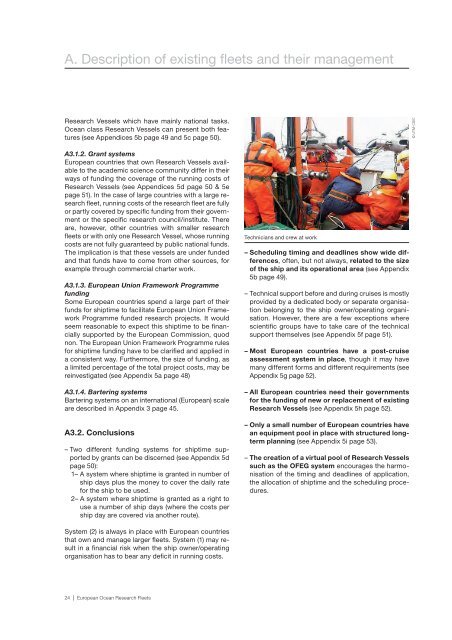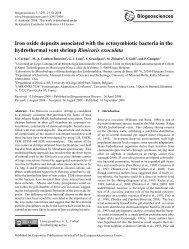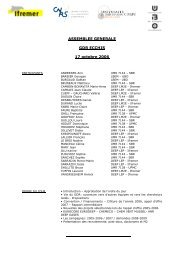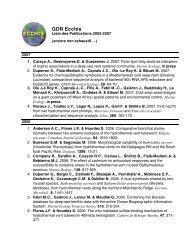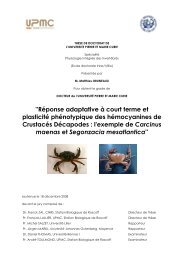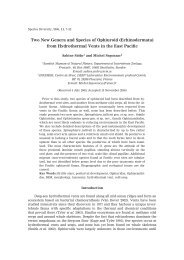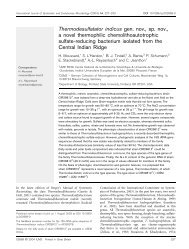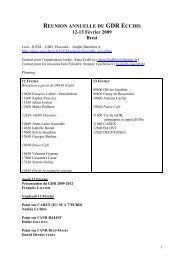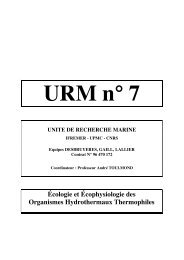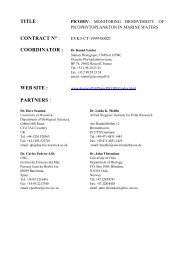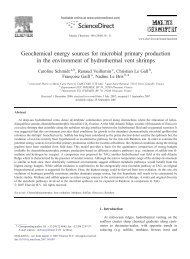European Ocean Research Fleets - uefiscdi
European Ocean Research Fleets - uefiscdi
European Ocean Research Fleets - uefiscdi
You also want an ePaper? Increase the reach of your titles
YUMPU automatically turns print PDFs into web optimized ePapers that Google loves.
A. Description of existing fleets and their management<br />
<strong>Research</strong> Vessels which have mainly national tasks.<br />
<strong>Ocean</strong> class <strong>Research</strong> Vessels can present both features<br />
(see Appendices 5b page 49 and 5c page 50).<br />
A3.1.2. Grant systems<br />
<strong>European</strong> countries that own <strong>Research</strong> Vessels available<br />
to the academic science community differ in their<br />
ways of funding the coverage of the running costs of<br />
<strong>Research</strong> Vessels (see Appendices 5d page 50 & 5e<br />
page 51). In the case of large countries with a large research<br />
fleet, running costs of the research fleet are fully<br />
or partly covered by specifi c funding from their government<br />
or the specific research council/institute. There<br />
are, however, other countries with smaller research<br />
fleets or with only one <strong>Research</strong> Vessel, whose running<br />
costs are not fully guaranteed by public national funds.<br />
The implication is that these vessels are under funded<br />
and that funds have to come from other sources, for<br />
example through commercial charter work.<br />
A3.1.3. <strong>European</strong> Union Framework Programme<br />
funding<br />
Some <strong>European</strong> countries spend a large part of their<br />
funds for shiptime to facilitate <strong>European</strong> Union Framework<br />
Programme funded research projects. It would<br />
seem reasonable to expect this shiptime to be financially<br />
supported by the <strong>European</strong> Commission, quod<br />
non. The <strong>European</strong> Union Framework Programme rules<br />
for shiptime funding have to be clarified and applied in<br />
a consistent way. Furthermore, the size of funding, as<br />
a limited percentage of the total project costs, may be<br />
reinvestigated (see Appendix 5a page 48)<br />
A3.1.4. Bartering systems<br />
Bartering systems on an international (<strong>European</strong>) scale<br />
are described in Appendix 3 page 45.<br />
A3.2. Conclusions<br />
– Two different funding systems for shiptime supported<br />
by grants can be discerned (see Appendix 5d<br />
page 50):<br />
1– A system where shiptime is granted in number of<br />
ship days plus the money to cover the daily rate<br />
for the ship to be used.<br />
2– A system where shiptime is granted as a right to<br />
use a number of ship days (where the costs per<br />
ship day are covered via another route).<br />
Technicians and crew at work<br />
– Scheduling timing and deadlines show wide differences,<br />
often, but not always, related to the size<br />
of the ship and its operational area (see Appendix<br />
5b page 49).<br />
– Technical support before and during cruises is mostly<br />
provided by a dedicated body or separate organisation<br />
belonging to the ship owner/operating organisation.<br />
However, there are a few exceptions where<br />
scientific groups have to take care of the technical<br />
support themselves (see Appendix 5f page 51).<br />
– Most <strong>European</strong> countries have a post-cruise<br />
assessment system in place, though it may have<br />
many different forms and different requirements (see<br />
Appendix 5g page 52).<br />
– All <strong>European</strong> countries need their governments<br />
for the funding of new or replacement of existing<br />
<strong>Research</strong> Vessels (see Appendix 5h page 52).<br />
– Only a small number of <strong>European</strong> countries have<br />
an equipment pool in place with structured longterm<br />
planning (see Appendix 5i page 53).<br />
– The creation of a virtual pool of <strong>Research</strong> Vessels<br />
such as the OFEG system encourages the harmonisation<br />
of the timing and deadlines of application,<br />
the allocation of shiptime and the scheduling procedures.<br />
© UTM-CSIC<br />
System (2) is always in place with <strong>European</strong> countries<br />
that own and manage larger fleets. System (1) may result<br />
in a financial risk when the ship owner/operating<br />
organisation has to bear any deficit in running costs.<br />
24 | <strong>European</strong> <strong>Ocean</strong> <strong>Research</strong> <strong>Fleets</strong>


